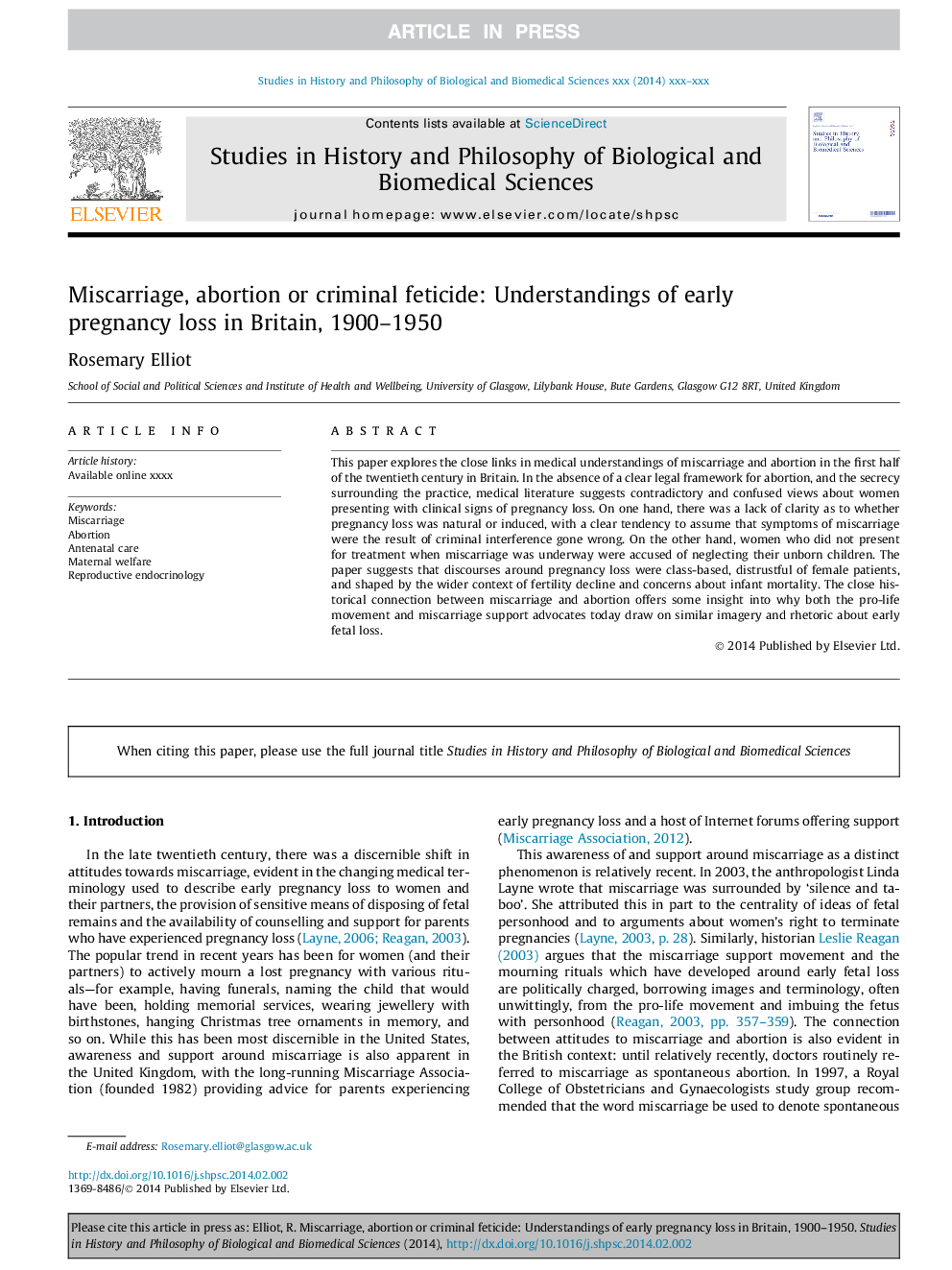| کد مقاله | کد نشریه | سال انتشار | مقاله انگلیسی | نسخه تمام متن |
|---|---|---|---|---|
| 7552565 | 1490519 | 2014 | 9 صفحه PDF | دانلود رایگان |
عنوان انگلیسی مقاله ISI
Miscarriage, abortion or criminal feticide: Understandings of early pregnancy loss in Britain, 1900-1950
ترجمه فارسی عنوان
سقط جنین، سقط جنین یا سموم دفع آفات: درک ابتلا به زایمان زودرس در انگلستان، 1900-1950
دانلود مقاله + سفارش ترجمه
دانلود مقاله ISI انگلیسی
رایگان برای ایرانیان
کلمات کلیدی
سقط جنین، سقط جنین، مراقبت های دوران بارداری، رفاه مادران، غدد درون ریز،
ترجمه چکیده
این مقاله پیوندهای نزدیک در درک پزشکی از سقط جنین و سقط جنین را در نیمه اول قرن بیستم در بریتانیا بررسی می کند. در صورت عدم وجود یک چارچوب قانونی مشخص برای سقط جنین و محرمانه بودن این عمل، ادبیات پزشکی، دیدگاه های متضاد و اشتباه را در رابطه با زنان با علائم بالینی از دست رفتن حاملگی ارائه می دهد. از یک طرف، کمبود وضوح در مورد این که آیا حاملگی طبیعی بوده یا موجب شده است یا خیر، با تمایل مشخصی به فرض بر این شد که علائم سقط جنین، نتیجه دخالت جنایی است. از سوی دیگر، زنان که در هنگام انجام سقط جنین برای درمان نرفتند، متهم به نادیده گرفتن فرزندان نوزادشان بودند. این مقاله نشان می دهد که گفتمان در مورد دوران بارداری براساس طبقه بندی، بی اعتمادی نسبت به بیماران زن و به شکل گسترده تر با کاهش باروری و نگرانی در مورد مرگ و میر نوزادان شکل گرفته است. ارتباط نزدیکی تاریخی بین سقط جنین و سقط جنین، برخی از بینش ها را در مورد اینکه چرا جنبش حامی جنس و حمایت از حاملگی از امروز حمایت می کند، به تصویر می کشد و حرف های مربوط به از دست دادن جنین زودرس را نشان می دهد.
موضوعات مرتبط
علوم زیستی و بیوفناوری
علوم کشاورزی و بیولوژیک
علوم کشاورزی و بیولوژیک (عمومی)
چکیده انگلیسی
This paper explores the close links in medical understandings of miscarriage and abortion in the first half of the twentieth century in Britain. In the absence of a clear legal framework for abortion, and the secrecy surrounding the practice, medical literature suggests contradictory and confused views about women presenting with clinical signs of pregnancy loss. On one hand, there was a lack of clarity as to whether pregnancy loss was natural or induced, with a clear tendency to assume that symptoms of miscarriage were the result of criminal interference gone wrong. On the other hand, women who did not present for treatment when miscarriage was underway were accused of neglecting their unborn children. The paper suggests that discourses around pregnancy loss were class-based, distrustful of female patients, and shaped by the wider context of fertility decline and concerns about infant mortality. The close historical connection between miscarriage and abortion offers some insight into why both the pro-life movement and miscarriage support advocates today draw on similar imagery and rhetoric about early fetal loss.
ناشر
Database: Elsevier - ScienceDirect (ساینس دایرکت)
Journal: Studies in History and Philosophy of Science Part C: Studies in History and Philosophy of Biological and Biomedical Sciences - Volume 47, Part B, September 2014, Pages 248-256
Journal: Studies in History and Philosophy of Science Part C: Studies in History and Philosophy of Biological and Biomedical Sciences - Volume 47, Part B, September 2014, Pages 248-256
نویسندگان
Rosemary Elliot,
